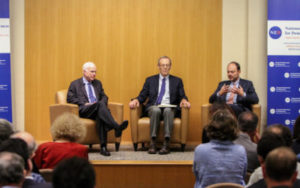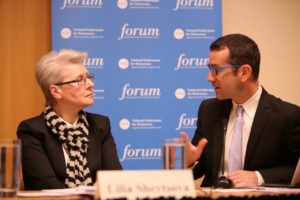Russia: who wanted Alexei Navalny dead? https://t.co/kcyoYvClkf via @financialtimes
— Democracy Digest (@demdigest) August 31, 2020
Nothing is as inspiring as seeing people take to the streets to demand their freedoms—and nothing is as terrifying for the dictators they are defying, The Economist observes:
In Belarus, among scenes that recall the revolts of 1989, people are turning out in their hundreds of thousands after a blatantly rigged election, heedless of the threat of state violence. In the Russian city of Khabarovsk tens of thousands march week after week to protest against the arrest of the local governor and the imposition of Moscow’s rules. Vladimir Putin is rattled. Why else is Navalny, an anti-corruption crusader and Mr Putin’s greatest popular rival for the Russian presidency, lying poisoned in a Berlin hospital bed?
Friends say the poisoning will only harden Mr Navalny’s resolve.

Vladimir Kara Murza (far right) with NED’s Carl Gershman (center) and Senator John McCain.
“I can give you 120 per cent that he will never do that. He will stay in Russia and continue to do what he does,” says the activist Vladimir Kara-Murza, a friend of Mr Navalny, who survived two attempts on his life. “The biggest gift we could give to those people in the Kremlin is if we got up and ran.”
Belarus has become a test for the West and its commitment to democracy; and to date, the West has failed that test, says analyst Liliya Shevtsova. Instead of supporting its democratic principles, the West has urged the Belarusian people not to do anything that will anger Russia or risk transforming their country into another Ukraine, Paul Goble reports:
The West had a chance to live up to its calls for democracy; but instead, it has once against shown itself far less concerned about that than about stability above all about having reasonable relations with Moscow …The Russian commentator points out that what is going on not only reflects “the hypocrisy of Western elites” but also is based on the notion that all conflicts can be resolved via compromise. That simply doesn’t work with a dictator who isn’t prepared to back down, especially one with a nuclear power in his corner.
 “The Kremlin cannot but feel satisfaction,” adds Shevtsova, a former NED Reagan-Fascell fellow (right), because by their actions “the liberal democracies have recognized a Russian sphere of influence and Belarus being part of it.”
“The Kremlin cannot but feel satisfaction,” adds Shevtsova, a former NED Reagan-Fascell fellow (right), because by their actions “the liberal democracies have recognized a Russian sphere of influence and Belarus being part of it.”
Sergei Guriev, a former Kremlin insider now an informal adviser to Navalny, says “smart voting” is a particular nuisance for the Kremlin. Russia’s stagnant economy and Mr Putin’s patchy response to the pandemic sent his approval ratings to record lows this year before a recent rebound. A June survey by the Levada Center, an independent pollster, found Mr Navalny was Russia’s second most “inspirational” politician, after the president. If the strategy is successful, says Guriev, Mr Navalny could help bring to power politicians from within the Kremlin’s approved slate of spoiler parties who become magnets for discontent, he tells the Financial Times. RTWT
Events in Minsk have shown again the limits of police violence. Even when applied with bestial enthusiasm it could not make up for Mr Lukashenko’s cataclysmic loss of legitimacy; instead it accelerated it. Better act savagely against a leader now than take on the people later, The Economist adds:
The irony is that this could lead to the regime’s eventual downfall being more tumultuous than it would have been. Mr Navalny may be the last Russian opposition leader who can control street protest while also engaging in negotiations with the Kremlin. His absence does not make future protests a lot less likely, but it makes them a lot less predictable. Mr Putin may feel that he has the situation under control. So did Mr Lukashenko.
What Putin fears – Russians and Belarusians are tired of backwards-looking autocrats https://t.co/QU4WWRvm8q
— Democracy Digest (@demdigest) August 31, 2020







